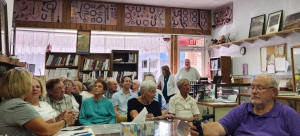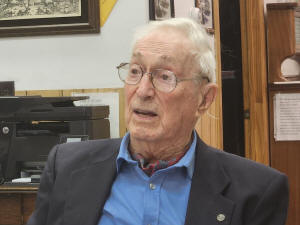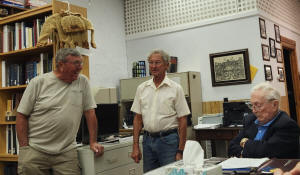|
 Program
Chair Diane Osborn introduced Gossett, who has lived in Logan County
for 100 years. She said Gossett would be reminiscing about 100 years
of changes in Logan County. Program
Chair Diane Osborn introduced Gossett, who has lived in Logan County
for 100 years. She said Gossett would be reminiscing about 100 years
of changes in Logan County.
For many years, Bill Gossett hosted a news talk show on the radio.
He and his late wife Jean Gossett owned and operated Gossett
Cleaners and Decorators. One of the things they sold was Mohawk
Carpeting.
As a young man, Gossett spent three years in the Army Air Corp
before coming back to Lincoln. Gossett’s father died at the young
age of 50 and Gossett got involved in business when he came back.

Nearly 35 people came to hear Gossett, who turned 100
last October and has been a fixture of the community for many years.
As Gossett began, he said he was honored to speak at the LCGHS
meeting and appreciated all who were there to hear him.
The title of his presentation was “Days of Yore.” Gossett said he
might get carried away rambling and they might have to get the hook
out like people used in Vaudeville. Gossett told everyone if he saw
the hook, he would know it was time to finish.

A few times, Gossett joked that he had gotten his
presentation down to three and a half hours. Because he has lived in
the community so long, Gossett had many stories about the community,
people and events.
When Gossett came home from war, his father was seriously ill, and
unable to fulfill his duties in business. Gossett’s mom had two
children still at home, so his mom’s hands were full taking care of
everything.
In 1942, Gossett had joined the Army Air Corps. He planned to return
to the University of Illinois when he got out. Returning to college
did not pan out for Gossett, but he said that was fine. Through the
years, Gossett said God has been very good to him, helped him make
good decisions and saved his life more than once.
On Chicago Street, just a block from where the LCGHS building is,
was the original location of Gossett’s Cleaners.
Also on Chicago Street was an Interurban Railroad stop. Gossett said
the Interurban Railroad was the transportation for Central Illinois.
Trains went to Peoria, Decatur, Danville, Springfield and St. Louis
among other places. Gossett said he would take the train to
Springfield every week to go to the orthodontist.
People would place milk cans by the tracks and the train would pick
them up the cans or exchange cans with people. Gossett said it was
likely some of the milk got spoiled.
With all the traffic, Gossett said going down Chicago Street could
be a problem. The street was narrow and the Interurban came down the
middle. Sometime traffic would be at a standstill from Pulaski
Street to Pekin Street.
On freight cars, Gossett remembers seeing bums riding with their
legs hanging out.

Alvey’s Drug Store was a place Gossett said was the
unofficial Republican headquarters for the county. Gossett remembers
a man named Joe Sapp getting Gossett’s son a summer job at the state
school. In return, Gossett had to buy a lot of fundraising tickets
from Sapp. Gossett said Sapp was as honest as the table is straight,
though Gossett also called Sapp unusual. Some in the governor’s
office would call it Sapp County instead of Logan County.
Kerpan’s Grocery was on the corner of Pulaski and Chicago Streets.
It was a three story building with no elevators. Gossett said the so
called “Kerpan’s Corner” had quite a bit of activity. Drug stores
include Firebackers, Boss Drugs and Hunter’s. Kresky’s was a dime
store.
Since there was no television yet, Gossett said stores were very
busy.
There was a Sears and Roebuck downtown, and Gossett recalls a man
walking on a tightrope between the store and the Broadway side of
the Logan County Courthouse. Gossett got the man’s autograph.
Saturday evenings were shopping nights. Gossett said some people
would just park their cars at Kresky’s corner to watch the action.
Streetcars up and down Chicago Street tended to cause traffic
issues. Gossett said it was almost certain that at some point during
the month, one or two cars would get “squeezed” and end up in the
repair shop. The interurban would not give the right a way to cars.
Other businesses Gossett remembers were Armor’s Creamery, Lincoln
Garment Factory and Lincoln Sand and Gravel.
The sand and gravel pit later formed Lincoln Lakes. Gossett said the
sand was very pure.
At Lincoln Lakes, Gossett said there was a learn to swim week every
summer. Gossett wanted to get his water safety instructor’s badge to
put on his swim trunks because he was already teaching out at the
lake.
Herb Alexander, who owned Alexander’s Grocery store, was Gossett’s
instructor. As part of the course, Gossett said you have to swim out
[to the deep end]. The instructor would take the part of a drowning
victim and grab the student from the front and back. Mr. Alexander
was a large man and Gossett was small. Alexander put Gossett through
the ropes, but Gossett passed the course.
The Independent Order of the Odd Fellows building on Pulaski Street
housed the Lincoln Courier. Gossett said John and Aileen Nugent were
the publishers. He said John, who was from England, wore an English
top hat and was an unusual individual.
Well to do Attorney Logan Hill went to Central America and sent John
Nugent a Boa Constrictor. Nugent put the snake in the front window
of the Courier office and Gossett said everyone wanted to go set it.
Lincoln Casket Company became Lincoln Store Fixtures and later Meier
Industries.
Gossett’s father grew up dirt poor but at some point, determined
that would not define him. As a result, Gossett’s father became very
successful. Gossett said he was a very lucky man and God gave him
parents with good sense. They pounded good sense into Gossett’s
head, though he sometimes found out things the hard way.
Something else Gossett remembers were the Chataqua events and the
large auditorium where many events were held. There was a man name
Eugene Sherrer who loved decorating the auditorium for the event.
A woman named Ella Brainard owned Brainard’s Park, which was the
grounds where the Chataqua took place. Gossett said there were
around 100 cottages on the grounds.

Speakers at the Chataqua included Billly Sunday.
Gossett said the Chataqua was a forerunner of Lincoln Community
Theater. There was a huge stage where locals would put on their own
plays. He recalls a man named Garkin Noel taking tickets at the
concession stand.
There was a Coca Cola bottling plant run by Howard Vaughn and his
son Jimmy and they had a concession stand at the Chataqua.
The Chataqua was a big event for the community. Gossett said farmers
from the surrounding rural areas would come in for the events.
One person asked when the Chataqua events ended, and the cottages
were moved. Gossett recalled it being in the mid-30s.
Another person recalled an article saying it ended in 1938. One
hundred cottages were moved to Lincoln Lakes.
When the Chataqua events ended, people started moving the buildings
to Lincoln Lakes. Gossett’s grandfather got permission to move a
cottage to Lincoln Lakes. Gossett’s dad remodeled the cottage, and
it became their summer residence. He and his siblings crowded into a
screened in area above the front porch to sleep. If they sat up too
fast, Gossett said they might knock themselves out.
At Lincoln Lakes, Gossett would shovel sand and pull weeds. In
return for this work, he would be given a swimming pass, which
Gossett’s dad said he needed to work for. He said the beach was
huge. Ladies would be on one side and gentlemen on the other and
they would put their clothing in a basket while they swam.

As a kid, Gossett rode his bike all over town. He
would often bike downtown then stand and watch auctions on the North
side of the courthouse. Gossett remembers one farm sale where he saw
a lady sobbing. When Gossett realized she was watching her property
being sold, he realized it was no longer fun to watch the sale, so
he quit going.
Livestock sales were held on Saturdays by Banister and Logan
Implement. The Logan County Bank is now located where they had the
implement store. Gossett recalls watching Auctioneer Colonel Wolpert
at these sales and said he was a dandy.
Back then, many had iceboxes and got ice from the icehouse. Gossett
said someone would deliver 10, 25 or 50 pound bags of ice. People
would place a sign in their window to show how many pounds they
wanted. The person would chip the ice and put it right in their
iceboxes.
There was also a place near Sangamon and Logan Street where people
could go and pick up bags of ice.
The police department years ago had a merchant policeman. It was
before the days they had two way police radios. Gossett said the
merchant policeman’s job was to go door to door and rattle the
doors. If the doors were firm, it was fine. If something was wrong,
the policeman had to do something about the problem.
[to top of second column] |

When the policeman would see a light on at a
restaurant down the street, he was supposed to call somewhere and
report it. Gossett said that is how the alarm was set.
Air Force Pilot Mark Collins once flew a VC3 down the middle of
Broadway below the deck of the Courthouse dome. Gossett said the
sound of the plane reverberated through town. Charlie Stringer got a
photo of the incident, which is in the Logan County Genealogical
Society building.
Though Gossett said Collins probably should have been
court martialed for the incident, the story is that Collin’s
commanding officer said, “I understand your trip home was very
successful.”
In Germany, Gossett once flew with Collins in a C47. Gossett’s first
plane ride was in a Ford trimotor with a corrugated fuselage. The
plane had landed near the Logan County Fairgrounds.
When Gossett found out the plane was out there, he rode his bicycle
to where the pilot had landed. Gossett conned the pilot into taking
him up in the plane for five dollars. Gossett had to ride home and
get the money. His mother was angry when she found out about it.
The Logan County Fair began in 1937. Gosset said the
first fair queen was Edna Buehler of Beason. She was later the
Gossett’ neighbor. Once his kids found out Buehler baked good
cookies, they bothered her to death to get cookies.
People would come from far and wide, and Gossett said the fair was
good for the community economically.
At the fair, Gossett said there were harness races in the afternoon
and a Society Horse Show in the evenings. Gossett loved watching the
Hackney ponies.
One of Gossett’s jobs was selling programs for both the afternoon
races and the horse show.

Many people asked for pencils so they could keep a
scoresheet. Gossett decided to go to Kresky’s Dime Store, where he
bought pencils for a few cents apiece. Gossett then sold the pencils
for ten cents apiece. He said it was the beginning of his
entrepreneurship.
Several people had their own “boxes” in the front row
at the grandstand. People would wear jackets and ties for the
Society Horse Show. In the evenings, at the Society Horse Show,
Gossett said the American Legion band would play. F.I. Crumb was the
announcer standing in the middle of the ring near the band.
To look at possibilities for entertainment at the fair, Gossett said
members of the fair board went to a national convention in Las
Vegas. They would book one they could afford.
One of the big acts Gosset remembers was David Merrifield’s trapeze
act. Merrifield had no rope or net under him and would do the act
beneath an airplane.
The pilot had a birthday during the fair one year. Gossett said he
and his wife had a birthday party for the man. The next morning, the
pilot took Gossett up in a helicopter around the county. It was
Gossett’s first helicopter ride.
Gossett’s first job was delivering the Pantagraph. He had to arrive
at 6:15 in the morning to take the papers, take them into the depot,
fold them and put them in bags on their bicycles. His route was on
the North side of Lincoln and many there were known for not paying
their bills.
Saturday was money collection day and Gossett said many people would
say, “I’m a little short today, Billy, can I catch you next week?”
The same thing would happen week after week. Eventually, Gossett had
to stop delivering the paper to those who got behind on payments.
Gossett said they often called to complain when that happened.
With Gossett working, his mom complained to his dad about how hard
he had to work. Gossett’s dad would then tell her hard work never
hurt anybody. That was his father’s dictum and Gossett said he was
correct.

In both Beason and Burtonview, Gossett had family.
Gossett’s dad would send him to work on his grandparents’ farm in
Burtonview in the summer. Gossett’s dad would make sure Gossett was
out of Lincoln and off the streets the first day school was out.
Because Gossett was small, he would have to stand on a stepladder to
harness the horses. He had to water and curry the horses too.
Plowing corn with a team was Gossett’s big job on the farm. Since
Gossett had short legs, the seat had to be adjusted. He bounced all
day in a metal seat.
As they plowed corn, Gossett said they would have to go across the
field three times. He remembers having a device next to the plow’s
seat that was a long stick with three prongs of wire. If you covered
up a hill of corn, Gossett said you had to stop and either get out
of the seat or back the horses up to uncover the corn. He remembers
uncovering a lot of corn.

Something else Gossett learned was to make sure the
equipment was clean. For example, the plow had to be greased, which
is something Gossett’s grandfather was a stickler about it. Gossett
said he learned a lot through osmosis but enjoyed working on the
farm very much. Farm business was great for Gossett because he
learned so much.
At threshing time, Gossett remembers getting in a horse drawn cart
and taking earthen jugs of water to the men. The jugs were wrapped
in burlap soaked in water to keep the water in the jugs cool.
Threshing time was a lot of work. Gossett said neighbors came around
to help each other out. Eating is part of what he remembers, but
Gossett found out there was a pecking order. Those who were not
ready to go back into the field would eat last because they had
plenty of time to eat. Gossett said the ones who had to get back
into the field quickly would eat first.
Pulling hay into the haymow was another job Gossett had on the farm.
If the assistant said, “whoa,” Gossett said he meant “whoa” right
then and not ten feet down the line. If Gossett did not stop when he
was supposed to, he would get a tongue lashing. He also learned a
few new words.
One time Gossett remembers letting his horses trot back from the
Burtonview grain elevator because the horses wanted to get him. The
road was rough, and the horses got wet with sweat. Gossett’s
grandfather was very disappointed in him, but it was a good learning
experience for him.
There was a tank used for watering horses. Since the water was cold,
one day, Gossett decided it would be nice to swim in it. Right away,
he went under. It scared the daylight out of him.
Gossett’s grandfather had a big windmill right next to the barn.
Gossett was in charge of making sure the windmill was on when it was
time for it to be on and off when it was time for it to be off.
Other memories

From the left, Richard Martin, Curtis
Fox and Bill Gossett
Around 1946, Gossett remembers the American Legion
inducting new members into the Legion. The event was in the
gymnasium of the State School and dedicated to the memory of Dr.
William Fox, who ran the state school for several years. Dr. Fox’s
son, Curtis Fox still lives in the area and is a member of LCGHS.
In the country, Gossett remembers a big flood that caused Sugar
Creek to rise. Warren Gallagher’s father died trying to get the
cattle out in the flood. The story Gossett recalls is that Gallagher
was in a water trough that overturned.
A man named Hauser Crane had contracted polio as a child. Gossett
remembers Crane using a bicycle to get around. Crane used his arms
to pedal the bicycle. Crane sold sunshine bottles for Crippled
Children’s work.
In those days, the Elks sponsored the Crippled Children’s Clinic. A
doctor from Peoria came in once a month to check the children out.
Once a year, the Elks had a festival to raise money for the clinics.
Gossett remembers the games of Bingo and Chance. All the money
raised benefited the children.
Burtonview’s one room school was on property originally owned by
Gosset’s grandmother. His grandmother gave it to the school on the
condition the land would always be used for educational purposes.
Otherwise, the property would revert to the estate.
Johnny Schwenoha, known as Coonhound Johnny, is another character
Gossett remembers. Johnny Schwenoha’s son Vincent Schwenoha started
the Tropics Restaurant at the four corners.
What Gossett remembers about the four corners is having to get his
father out of bed at 12:30 a.m. to tell him he had wrecked the car
there. At 100 years old, Gossett said he still has not lived that
down.
One time when Gossett snuck in the house an hour late, he found his
father sitting on his bed smoking a cigarette. Gossett said his
father’s verbatim remarks were “I hope it was worth it. I’ll talk to
you in the morning.” Gosett stewed all night.
Gossett closed by saying how lucky the community is to have the
Logan County Genealogical and Historical Society. He feels they do a
marvelous service for the community.
The next Logan County Genealogical and Historical Society meeting
will be held Monday, August 19 at 6:30 p.m. at the LCGHS building on
114 N. Chicago Street. Local authors will come to talk about their
books and possibly sign autographs.
In the upcoming months, Diane Osborne said she hopes to have someone
speak on the history of the Catholic Churches in Lincoln.
[Angela Reiners]
 |